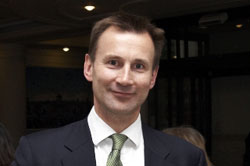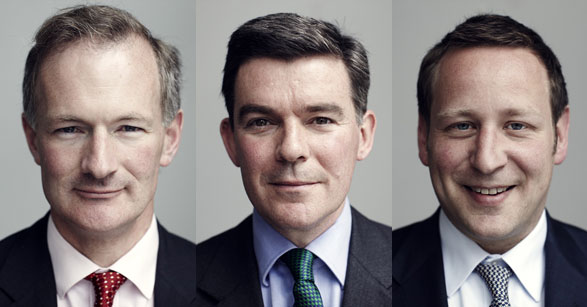
Jeremy Hunt, culture secretary
Culture under a coalition
With a new government in office for a few short weeks, The Leisure Review looks at the ConDem coalition’s culture team and wonders what we have been able to learn so far.

Jeremy Hunt, culture secretary
The World of Leisure, that ever-reliable source of daily cultural coverage that sits elsewhere on the pages of The Leisure Review, shows that the new government came into being on Tuesday 11 May when David Cameron and Nick Clegg walked somewhat awkwardly through the suddenly too narrow door of Number 10 to bring the nation another version of a new approach to politics. A little over a week later, on Wednesday 19 May, World of Leisure was able to report that Jeremy Hunt, the new secretary of state for culture, media, the Olympics and sport, had made his first speech, noting the promise that “culture will not be singled out as a soft target”. With the sport, leisure and culture sector already bracing itself for the realities of a bleak financial future, a new government and a new approach to culture was up and running.
The talking heads, whether elected or unelected, parliamentarians or political commentators, had spoken of little but cuts in spending during the election campaign and the topic continued to dominate in the post-election politicking of resignations, negotiations and coalitions. The new culture secretary continued the theme of reality biting but did his best to reassure the cultural world that he was, for the most part, on their side. Speaking at the Roundhouse in London, Hunt opened with a recollection that his last visit to the venue had been to see La Clique and a revelation that Charlotte Higgins, the Guardian’s arts correspondent had threatened to break his legs if he damaged the arts. His first cultural references were to Henry IV – “uneasy lies the head that wears the crown” – and to Russian dissident poet Osip Madelstam, heavyweight references designed perhaps to establish his cultural credentials but softened with the revelation that he discovered Madelstam on the Tube as part of the Poems on the Underground series.
He made his commitment to arts explicit at the outset: “Let me start by saying something to reassure Charlotte, something I hope you already know, which is I am totally passionate about arts and culture in our country. It is the most incredible privilege to do what I am doing and I am unbelievably excited. For me culture is not just about the economic value of our creative industries, it is what defines us as a civilisation. Culture helps us understand the world around us, explain it and sometimes escape from it – as Picasso put it, ‘washing the dust of daily life from our souls’.”
Down to details, he outlined plans for a review of the lottery to “restore” it to its original funding principles and provide 20% shares of lottery funding to the arts, heritage and grassroots sport; the Big Lottery Fund will have its share of proceeds capped at 40% of the total. The secretary of state’s approach to the work of his department would, Hunt explained, be based on the key principles of the mixed cultural economy, the provision of access to high-quality arts and arms-length control of cultural organisations by government funding. Free admission to museums will continue and he took time to pay tribute to Chris Smith “for battling for it and introducing it”. Hunt also spoke of the need to credit the Labour government for “the way in which arts policy has become a much more mainstream part of government policy as a whole”. Philanthropy and “the culture of giving” is to be given a big push, Gift Aid will be reformed and high-performing organisations will be offered longer-term funding settlements to allow greater confidence in planning. Culture, he stressed, will not bear a disproportionate weight of funding cuts and he emphasised that he is a firm believer in “art for art’s sake” but – there was always going to be a ‘but’ – there will be no new money, grant-givers will be expected to spend no more than 5% of funding on administration and there will be in-year cuts in the budget with tough public spending settlements over the next three years. There will, he predicted, be gaps in funding.
Hunt won some kudos for cancelling his ministerial cars, thus saving £250,000 from his departmental budget, and making the journey from Cockspur Street to Buckingham Palace to collect the paraphernalia necessary to his post as a privy councillor by foot. Given that it is only a 15-minute stroll from the DCMS to the Palace, that is perhaps as it should be but this mingling of ministerial humility and budgetary largesse was later diluted by the revelation that the coalition government would be applying the no cars rule to all ministers. To some commentators, that the culture secretary was able to get his sackcloth on first was an illustration of his close proximity to the Cameron inner circle. Having been a Cameron loyalist since the days of the future prime minister’s party leadership campaign and served in the shadow cabinet since 2005 (disability and then culture shadow), Hunt was expected to rise and rise quickly within a Tory administration and for some the culture slot was an unexpectedly lowly beginning. Generally held to be a bright and personable individual by those who know him, the new culture secretary shows all the attributes of a Conservative stalwart. Member of Parliament for South West Surrey, Hunt was head boy of Charterhouse and took a first-class degree in politics, philosophy and economics from Oxford University. He taught English in Japan and made a good chunk of money by setting up an educational publishing company. The few blots on his record include £9,500 repaid in expenses during the recent parliamentary unpleasantness and some virulently anti-Clegg tweeting during the election campaign, remarks swiftly removed from public view, if not public memory, when the post-election dust was beginning to settle.
Every new government reflects its own orthodoxies and the team that the culture secretary has gathered around him follows form in this respect. Ed Vaizey serves as culture minister with media, arts, museums, galleries and libraries on his list of responsibilities. MP for Wantage and Didcot, Vaizey studied at Merton College, Oxford and worked as a political researcher, barrister and the director of a public relations company before getting in to politics full time. John Penrose, tourism minister with additional responsibility for Royal Parks and household, heritage, the built environment and the lottery, studied at Cambridge and has a background in publishing, banking and management consulting. Hugh Robertson, minister with responsibility for sport and the Olympics, has been MP for Faversham Mid Kent since 2001. Robertson stands out from his fellow culture ministers by avoiding Oxbridge but, by augmenting his stint at Reading University with Sandhurst and a career in the army and subsequently with Schroders investment bank, he falls within the Tory pale.
Since this team was assembled, the chancellor of the exchequer has begun his work of implementing savings in the government’s budget. The DCMS will have to take a £88 million hit and local government will be looking at £1.2 billion in cuts. Under these headline figures it seems that all DCMS-funded organisations will be looking at a 3% cut in their budgets, although Arts Council England has been singled out for a 4% cut in their funding, a total of £19 million, which is an additional £5 million to lose over and above the standard 3%. The Tate will be cut by £2.1 million, the British Museum £1.8 million, English Heritage £4.8 million and the Science Museum £1.47m. The Olympic budget was, as predicted, subjected to some pain, although the £27 million annual cut to the venue construction budget was felt to be comparatively modest. In this context the decision to dispense with the DCMS ministerial motor pool seems both appropriate and modest. Whether Mr Hunt will end up having his shins kicked by the Guardian arts desk remains to be seen.
The Leisure Review, June 2010
© Copyright of all material on this site is retained by The Leisure Review or the individual contributors where stated. Contact The Leisure Review for details.
Download a pdf version of this article for printing
